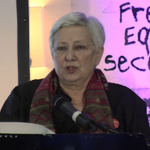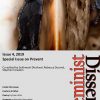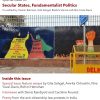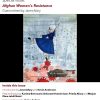Antisemitism exists in all parts of British society and the Labour Party is the only mass organisation which is trying to deal with it, although so far not in a very effective way. However, we have to find ways to neutralize this weaponization of accusations of antisemitism from dividing and destroying the Labour Party at a time that Boris Johnson and the Tories are destroying the UK. We also need to continue to fight antisemitism in the context of fighting other forms of racism and discrimination, within the Labour Party and in government and society as a whole.
Last week the EHRC (Equalities and Human Rights Commission) published the report of their investigation into antisemitism in the Labour party. They had a specific remit. It was not their job to contextualize their findings in relation to a) the ways other forms of racisms are dealt with in the Labour party and b) the ways antisemitism operates in the wider British society outside the Labour party. Nevertheless, this is what the Labour party and the rest of us will need to do in order to put the report into perspective and develop ways of dealing with it.
In this short blog, however, I’m not going to embark on this mammoth task, nor carry out a detailed critique of the report [i]. Rather, I’m going to focus on some of the contextual issues we need to be concerned with when reflecting upon the report’s implications. In particular, I want to reflect upon two crucially important questions. The first one is why is it that so many Jews, not necessarily religious and not necessarily seeing themselves as represented by the Jewish Board of Deputies, have come to fear what they see as the antisemitism of the Labour party? This is despite the fact that many of them do not seem to fear the much more prevalent antisemitism of the Right, including not just the extreme right but also as represented by Boris Johnson and his friends and their association with many neo-Nazi parties all over Europe. (Many of these are the same extreme right leaders, like in Hungary and Poland, that Netanyahu, the Prime Minister of Israel, has been befriending, to say nothing of Trump et al). The second question that I will address briefly, is why accusations of antisemitism of the Labour Party have been so successful in dividing the party and delegitimizing the radical left.
As a starting point, I should say that I’ve been concerned with issues of antisemitism all my life, as a daughter of a family most of whose members were murdered by the Nazis and their local helpers in Lithuania. However, after growing up at the heart of the Israeli Labour Zionist establishment and undergoing a long and painful process of transformation, I’ve come to define myself as an ant-Zionist diasporic Israeli Jew, because I’ve realized that racism against one grouping should not – and cannot – be solved by perpetuating racism against other groupings. All forms of racism need to be fought against and not just antisemitism – they all have their own specificities but also their similarities and historical links [ii] and anyone, including victims of racism, can become a racist – something I observed a plenty while growing up in Israel.
Living for most of my life now as part of London metropolitan society, working as a sociologist specializing in the field of intersectional nationalisms, racisms and the politics of belonging, I’ve enjoyed the experience of being part of London‘s pluralist, mostly convivial society, in which many of us were able to build bonds of friendship and transversal solidarities across boundaries of race, ethnicity and culture. This, however, has required us to develop a counterculture to the intersectional racialised patterns which have been historically inherent in European and other religious and scientific traditions. Anti-Black, anti-Muslim and anti-Jewish as well as other forms of racism have been grounded within these histories.
As mentioned above, the EHRC report does not deal with these issues and has focused its investigation on the ways in which complaints about antisemitism have been dealt with in the Labour Party. (They did not look at other forms of racism although I am sure they would have produced similar findings had they done so.) It found issues relating to procedures, leadership and culture in the party that affected how issues of antisemitism have been dealt with and which have caused some Jewish members to feel unsafe. Specifically, they investigated 70 complaints and found only 2 cases of unlawful antisemitic harassment although they found 18 more borderline cases and others in social media carried out by ‘ordinary’ and not official agents of the Labour Party. It is important to point out that the complaints referred to in the report have not been the only complaints of antisemitism by members of the Labour party, especially against members on the right of the party (as the ironic letter from the members of JEWDAS has pointed out).
The EHRC report pointed out that although processes to deal with complaints against antisemitism improved under Corbyn’s leadership, they still remained inefficient, non-transparent and subject to political interference from the leadership that meant that there were sometimes long delays in addressing complaints and some were left untouched altogether. This obviously is something which needs to be taken up very seriously by the Labour party and dealt with properly and transparently. In addition, the report also discusses what it calls a party culture that needs to be tackled and transformed.
The report presents a long list of recommendations regarding the procedures and leadership and recommended training and education to deal with the ways in which antisemitism permeates Labour party culture. However, the definition in the report of what constitutes adequate training and education is not clear beyond the need to apply it to all those who have been found to have engaged in an antisemitic act and all party officials [iii]. This is an important question that the party and all of us who are concerned with this issue need to contemplate. However, what the report does specify, and rightly so, is that this (re-) education process needs to be carried out in the context of both the right to free speech and a recognition of the need to ‘engage with Jewish stakeholders to develop and embed clear, accessible and robust principles and practices to tackle antisemitism and to instil confidence for the future.’
The specific perspectives of those who are subject to racist narratives and practices are, indeed, crucial whenever one wants to tackle issues of racism. However, while it is safe to assume that all Jews object to, and feel hurt by, antisemitism, there is no single political or organizational body which unites all Jews. Indeed, constructing them as a homogenous body with one voice in itself might be understood as a racialised construct. It is therefore important that the consultation with Jewish stakeholders should be inclusive and include all major Jewish strands, especially those historically and at present associated with the Labour Party and including the many (although in the minority) Jews like me who considers herself as an anti-Zionist diasporic Israeli Jew.
This is important because the question concerning who should be considered a legitimate Jewish stakeholder is closely related to the definition of antisemitism. The EHRC report does not discuss it explicitly, but although the issues of Israel and Zionism do not occupy central stage in their assessment of antisemitism they do not challenge the controversial IHRA definition that the Labour party has adopted. This definition, via its illustrative examples, distinguishes between legitimate and illegitimate critiques of Israel. Problematising the Zionist political project as a settler colonial project, for instance, is considered to be illegitimate. This is something which I and many others object to. Of course, critiques of Israel and Zionism can be antisemitic – but only if antisemitic tropes have been used in this problematisation [iv]. Many – although by no means all – of the accusations of antisemitism in the Labour Party stemmed from what was considered to be antisemitic critiques of Israel and Zionism.
This brings me to the first question I consider as crucial to reflect on, i.e., why has the antisemitism in the Labour Party been perceived as so much more threatening to so many British Jews than the antisemitism of the Right? To answer this question, we need to relate to the role of Israel in the psyche and identities of the majority of mainstream Jews in the UK (and in other western countries). From a minority movement for many years, Zionism came gradually, after the establishment of the state of Israel but especially after the 1967 war, to play two major roles. First, identifying and supporting Israel has become an easy way to maintain and reproduce a Jewish identity in an age when Jews were not blatantly persecuted for being Jewish, especially for those who are not Ultra-Orthodox Jews, for whom being Jewish is a total way of life. So, Israel has become not only a form of collective identity but also a post factum homeland even to Jews who have never lived in Israel or even had any relatives living there. It has also become a sort of insurance policy, a place Jews can escape to if things become too bad in the diaspora. Never mind that for many years Israel has been physically the most dangerous place for Jews to live in. Or that it has been highly dependent on the support of diasporic Jews and the governments of the countries where they live. Or that it was only because of the historical accident of the British defeating the German army in North Africa that the Jews living in Palestine were not exterminated like the Jews in other countries occupied by the Nazis.
So in the post WW2 era, the antisemitism of the Right has mostly caused many Jews feelings of being othered, discomfort and indignation but, except in extreme cases of violence and terrorism, not the real sense of existential fear like they feel when Israel is criticized and its right to exist as an exclusionary Jewish state is questioned. This is a really difficult issue and will take time and patience to deal with. However, ironically, the constant move of Israeli politics to the right has been helping in this. Trump and Netanyahu’s rule have opened a real divide within the established Jewish community in the USA, especially among the younger generation, and has problematised their identification with Israel. This has not yet become so widespread in the UK, unfortunately.
My second question concerns why accusations of antisemitism have proven to be such a successful strategy for attacking the left in the Labour Party. The answer to this is even more complicated. Part of it is the very efficient machinery which has been mobilized by organizations like Campaign Against Antisemitism, CAA and the Israeli lobby to mount an endless stream of accusations over many years. Only hours after the publication of the EHRC report, the CAA submitted a document of more than 70 pages to Keir Starmer, demanding that he suspend more than 30 main officers of the party including many left MPs and the deputy leader of the party. The document must have been long in preparation, waiting in the wings. Another part of the answer of the vulnerability of the Left to accusations of antisemitism has been the fact that often there has been no real understanding in the Left of the emotional, as well as normative and political issues involved in some of the accusations I referred to above.
But part of the answer is that the Left has sometimes left itself vulnerable to this kind of weaponisation of accusations of antisemitism. It needs to be extremely vigilant not to give hostages to fortune. Here are a couple of examples. First, there has been the tendency of some in the Left to not only defend the rights of all victims of imperialism and colonialism, but also to see them automatically as political allies – the enemy of my enemy is my friend. This has led to uncritical solidarity with fundamentalist movements, especially in the Muslim world. Second, there has been a remnant of traditional cultural antisemitic stereotypes, which have been strongest in the populist right but prevalent also among what August Bebel has called the ‘socialism of fools’, of identifying all Jews with Capital. This made Corbyn, for example, insensitive to antisemitic portrayal of a capitalist in the famous Mear One mural.
When I observed the press conference of the CAA after the publication of the EHRC report, they warned against two kinds of responses to the accusations of antisemitism both of which they define as forms of antisemitism, although these are not found in the EHRC report. The first is denialism, whenever people deny that antisemitism exists in a particular context or see certain estimates of its scale as exaggerated, whatever the empirical basis of that challenge is (obviously, Keir Starmer has adopted this criterion of the CAA in his suspension of Corbyn). The second practice they warned against is that of investigating the political motivations of those who make the complaints of antisemitism. This is very dangerous and the opposite of what the report warns against, which is political interference with dealing with accusations. Of course, one needs to deal with accusations of antisemitism – and other forms of racism – and establish their validity or not. But not exploring who complains, and why, gives free rein to any malicious force to use antisemitism as a manipulative weapon against the left in the Labour Party and in general, to the detriment of us all.
Antisemitism exists in all parts of British society and the Labour Party is the only mass organisation which is trying to deal with it, although so far not in a very effective way. However, we have to find ways to neutralize this weaponization of accusations of antisemitism from dividing and destroying the Labour Party at a time that Boris Johnson and the Tories are destroying the UK. We also need to continue to fight antisemitism in the context of fighting other forms of racism and discrimination, within the Labour Party and in government and society as a whole.
[i] For those interested in such detailed critique, please refer to the excellent work carried out by Jewish Voice for Labour https://www.jewishvoiceforlabour.org.uk/
[ii] See, for example the report by SSAHE https://acssmigration.files.wordpress.com/2020/03/ssahe-report-march-2020.pdf
[iii] For elaboration of this point please see the blog written by Tony Booth, Miriam David and Naomi Winborne-Idris of the Jewish Voice for Labour Education group https://www.jewishvoiceforlabour.org.uk/article/saving-education-from-the-ehrc-report/
[iv] See my discussion of this in ‘Feminism, antisemitism and the question of Palestine/Israel’ in K. Fakier., D. Mulinari and N. Rathzel (eds), Marxist-Feminist Theories and Struggles Today, Zed Press, 2020 pp249-260.
Author
-

Nira Yuval-Davis is an editorial collective member of Feminist Dissent. She is Professor Emeritus, Honorary Director of the Research Centre on Migration, Refugees and Belonging (CMRB) at the University of East London. She has been the President of the Research Committee 05 (on Racism, Nationalism, Indigeneity and Ethnic Relations) of the International Sociological Association, founder member of Women Against Fundamentalism and the international research network on Women In Militarized Conflict Zones and has acted as a consultant for various UN and human rights organisations. She won the 2018 International Sociological Association Distinguished Award for Excellence in Research and Practice. She has written widely on intersected gendered nationalisms, racisms, fundamentalisms, citizenships, identities, belonging/and everyday bordering as well as on situated intersectionality and dialogical epistemology. Among her books are Woman-Nation-State, 1989, Racialized Boundaries,1992, Unsettling Settler Societies, 1995, Gender and Nation, 1997, The Warning Signs of Fundamentalism, 2004, The Politics of Belonging: Intersectional Contestations, 2011, Women Against Fundamentalism, 2014 and Bordering (2019). Her works have been translated into more than ten languages.
View all posts









.jpg)

